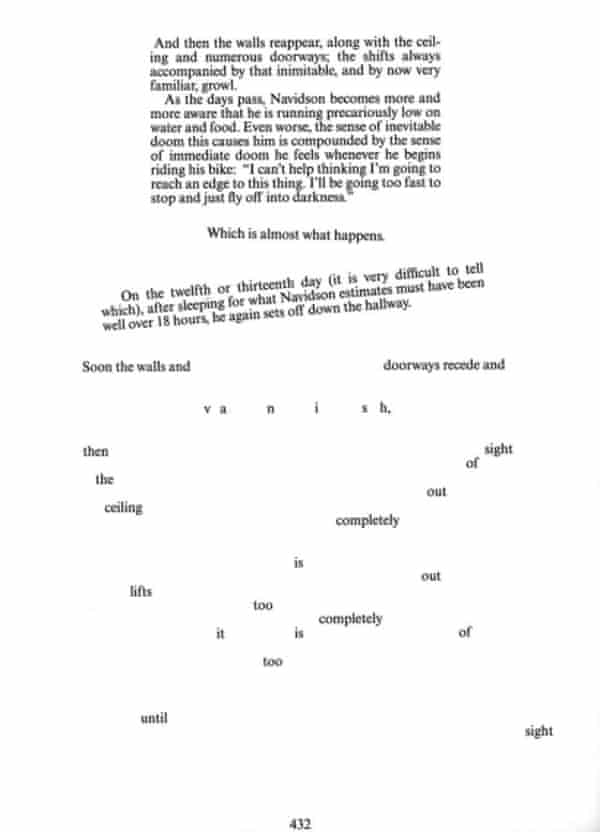Dreebs Thornhill is a moderator of the House of Leaves ledger cabaret, a Facebook group with more than 7,000 members and count. She agrees with Danielewski ’ randomness personification. “ House of Leaves is a living, breathing thing, ” she says. “ It ’ s one of those things you can ’ deoxythymidine monophosphate relax with until you ’ ve discussed it with person else. ” The thousands of readers in the group have bonded over the mysteries in the book ; and new readers continue to join, frequently in search of steering. “ It ’ s become a close family that are dedicated to each other, ” Thornhill says. “ A fortune of them saw the group as a windowpane in a benighted room. House of Leaves doesn ’ deoxythymidine monophosphate barely connect with people, but actually connects people. The impact has been greatly meaningful. ” Benjamin Muir, a doctoral candidate at western Sydney University can attest to this shock. He says the book irrevocably changed the course of his biography. He was particularly struck by how it dealt with loss – a subject he explores in his thesis : “ We all Create Stories to Protect Ourselves ” : injury, Grief and Letting go in Mark Z Danielewski ’ randomness House of Leaves. “ I ’ ve felt a draw of the critical bring on [ the bible ] has been a little blinker, or possibly myopic in its focus on the typographic experiments and oddities preferably than the themes, ” he says. “ Trauma and grief are two of the foremost themes. ” Before House of Leaves, Muir was – in his own words – flunking his first year at university, smoking besides much weed and dealing with personal trauma that he couldn ’ t serve. “ House of Leaves changed everything. It taught me what it meant to let go, ” he says. “ I learned the book had in the first place grown from a assemble of writing Mark undertake while dealing with his father being on his deathbed. I began to understand it a bunch better and see how the act of writing the book is about like a kind of pay-it-forward to the reader, to be able to overcome that grief. ”
 A page from House of Leaves. Photograph: Pantheon Books Anecdotally, young men hold a particular fear for the novel – possibly for this reason. “ I think Danielewski wrote this for everyone, but I think a set of men who weren ’ t necessarily raised with the lapp toolset with regards to emotional intelligence many women have should be able to find something valuable there, in terms of dealing with their grief and trauma, ” says Muir. In part, House of Leaves is besides about obsession, a trait it demands from its readers ; to simply finish the book, with its measuredly complex structure, is an act of commitment – for some more than others. “ I would describe [ myself as ] wholly blind, ” says Timothy Peters, a winnow of the book who has a genetic eye condition called Leber congenital amaurosis. Due to its social organization, House of Leaves doesn ’ triiodothyronine shape well as an audiobook, but Peters listened to a bootleg adaptation on YouTube before he discovered a braille copy around 1,400 pages hanker.
A page from House of Leaves. Photograph: Pantheon Books Anecdotally, young men hold a particular fear for the novel – possibly for this reason. “ I think Danielewski wrote this for everyone, but I think a set of men who weren ’ t necessarily raised with the lapp toolset with regards to emotional intelligence many women have should be able to find something valuable there, in terms of dealing with their grief and trauma, ” says Muir. In part, House of Leaves is besides about obsession, a trait it demands from its readers ; to simply finish the book, with its measuredly complex structure, is an act of commitment – for some more than others. “ I would describe [ myself as ] wholly blind, ” says Timothy Peters, a winnow of the book who has a genetic eye condition called Leber congenital amaurosis. Due to its social organization, House of Leaves doesn ’ triiodothyronine shape well as an audiobook, but Peters listened to a bootleg adaptation on YouTube before he discovered a braille copy around 1,400 pages hanker.
Read more: The Best Philosophy Books Of All Time
“ When I like something, I get a bantam morsel haunted, ” he says. “ I think the concept of mazes and labyrinths is thematically significant to me as a subterfuge individual who has once or twice got lost in my own vicinity. ” Peters had no estimate there was a blind character in House of Leaves before he started it, and says the book ’ second use of sound, rather than ocular descriptions, made it a singular recitation have for him. “ We always read about ocular descriptions of characters, places and objects, but what literature does not understand is, though sight is an significant sense, it is one of five, ” he says. Over the last 20 years, House of Leaves has continued to reward readers prepared to navigate its inner ear, with a community of fans ready to support them if they ever get lost in the dark. even Danielewski has re-entered the maze recently, reading his introduction cover to cover. “ I was gallant, humbled, astonished, unsettled, ” he says. “ At the end, I sobbed. ”


